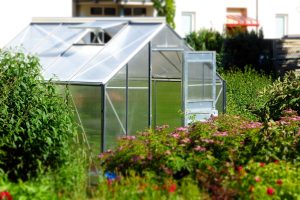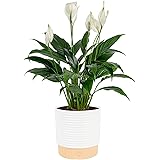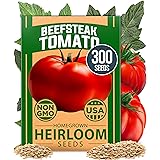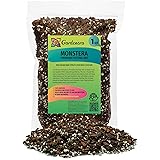
Is a greenhouse a good investment? Well, Investing in a greenhouse is 100% a good decision due to its ability to facilitate year-round cultivation, extend growing seasons, future-proof lifestyle against weather variations, promote eco-friendly gardening practices, and contribute to personal wellness through stress reduction and a deeper connection with nature.
In a world where sustainability and self-sufficiency are gaining paramount importance, investing in a greenhouse emerges as a strategic move beyond nurturing plants.
The advantages span from environmental considerations to personal well-being, making a greenhouse not just a structure but a transformative investment.
Here are ten compelling reasons why having a greenhouse is a smart and forward-thinking choice.
Also Read Best Layout For A Greenhouse.
You Might Also Like
10 Reasons Why A Greenhouse Is A Good Investment?
1. Year-Round Cultivation Makes Greenhouse A Good Investment
Year-round cultivation refers to growing crops continuously throughout the year, regardless of seasonal changes. The Year-Round Cultivation ability of a greenhouse is one of the critical factors that make it a good investment for several reasons:
Extended Growing Season: Greenhouses provide a controlled environment. As a result, they are great investments that allow hobby farmers to grow season extension ability beyond traditional outdoor limits. This means crops can be cultivated during periods of the year when outdoor conditions, such as winter or extreme heat, might be unfavourable.
Optimal Growing Conditions: Greenhouses allow growers to regulate temperature, humidity, and light levels. This control creates an ideal plant environment, promoting faster growth and higher yields. It also enables cultivating crops that may not thrive in the local climate.
Crop Diversification: Farmers can diversify their crops and experiment with different varieties with year-round cultivation. This flexibility is particularly advantageous for meeting changing market demands or responding to shifts in consumer preferences.
Consistent Supply for Markets: Greenhouses are also investments that are worth it as they offer not only reliable but a fresh supply of produce throughout the year. For this reason, a greenhouse investment helps farmers establish relationships with retailers, restaurants, or other markets that require a steady and predictable produce source.
Increased Profitability: Year-round cultivation and the ability to produce high-value greenhouse crops can contribute to increased profitability, hence an investment that is worth it. The continuous production cycle allows for more efficient use of resources and maximizes the return on investment in greenhouse projects.
Pros:
- Extended Growing Season
- Optimal Conditions
- Crop Diversification
- Consistent Supply
- Risk Mitigation
- Higher Quality
- Increased Profitability
Cons:
- Initial Cost
- Energy Expenses
- Maintenance Effort
2. Extending Growing Seasons With A Greenhouse Investment
One of the primary advantages of a greenhouse is its ability to extend growing seasons. This means you can cultivate a wider variety of plants that might not typically survive in your local climate. Extending growing seasons is a crucial advantage of greenhouses and a compelling reason why they are considered a good investment. Here are several reasons why this capability is beneficial:
Year-Round Production: Greenhouses can protect plants from harsh weather conditions, allowing for year-round cultivation by creating a controlled environment. This extended growing season enables farmers and gardeners to produce crops when traditional outdoor farming might be limited or impossible due to weather extremes, making the Greenhouse an investment that you should definitely consider.
Reduced Environmental Risks: By minimizing exposure to external elements, greenhouses help reduce the risk of crop damage due to factors such as storms, hail, or excessive rainfall. This protection enhances overall crop reliability and reduces the uncertainty associated with weather-related challenges.
Improved Crop Quality: The controlled environment within a greenhouse promotes consistent and optimal growing conditions, resulting in improved crop quality. This is especially important for crops sensitive to temperature, humidity, or light fluctuations.
In summary, extending growing seasons through a greenhouse is a powerful feature that contributes to increased agricultural productivity, improved crop quality, and greater economic viability for farmers.
Moreover, Extended It allows for more efficient use of resources and controls the growing environment, which is impossible in open-field agriculture. Consequently, the extended growing seasons make a greenhouse a valuable and attractive investment for those involved in agriculture and horticulture.
Pros:
- Year-round crops
- Optimal conditions
- Early planting
- Late harvesting
- Crop diversity
- Frost protection
- Improved quality
Cons:
- High initial cost
- Energy expenses
- Maintenance effort
3. Environmental Impact: Greenhouses Promote Eco-Friendly Gardening Hence A Good Investment
Investing in a greenhouse aligns with eco-friendly gardening practices. The enclosed space allows for efficient water usage and minimizes the need for pesticides, thus reducing negative environmental impact. The Eco-Friendly Gardening ability of a greenhouse contributes significantly to why it is considered a good investment for several reasons:
Resource Efficiency: Unlike traditional gardening techniques, Greenhouse investment is 100% good as it enables more efficient use of resources, such as water and fertilizers, than traditional outdoor gardening. The controlled environment allows for precise irrigation and nutrient application, minimizing waste.
Energy Conservation: Many modern greenhouses are designed with not only advanced ventilation systems but energy-efficient features, which include insulated walls and roofs. This helps maintain optimal growing conditions while minimizing energy consumption, making Greenhouse investment environmentally friendly.
Extended Growing Season: Greenhouses grow the growing season by providing a stable and controlled climate. This means that farmers can cultivate crops year-round, reducing the need for importing produce from distant locations and lowering the associated carbon footprint of transportation.
Lastly, the ability of a greenhouse to promote eco-friendly gardening practices and reduce the environmental impact of traditional agriculture makes it a wise investment for those looking to combine agricultural productivity with sustainability.
Pros:
- Energy Efficiency
- Water Conservation
- Year-Round Growing
- Reduced Pesticide Use
- Increased Crop Yield
- Controlled Environment
- Sustainable Practices
Cons:u
- Initial Cost
- Technical Complexity
- Limited Crop Variety
4. Greenhouse offers plants Protection Against External Threats; Hence, A Good Investment
The ability of a greenhouse to offer plant protection is one of the key reasons why investing in a greenhouse can be advantageous. Greenhouses create a controlled environment that shields plants from various external factors, providing a stable and favorable climate for their growth.
Here are some reasons why this plant protection feature makes a greenhouse a good investment:
Temperature Control: Greenhouses allow for precise temperature regulation, protecting plants from extreme heat or cold. This is particularly important for sensitive plants that may not thrive in fluctuating outdoor temperatures.
Frost Protection: Greenhouses provide a barrier against frost, safeguarding plants from frost damage during cold seasons. This is crucial for extending the growing season and protecting crops susceptible to frost.
Wind and Storm Protection: Greenhouse structures buffer against strong winds and storms, shielding plants from physical damage. This protection is precious in areas prone to severe weather conditions.
Generally speaking, the ability of a greenhouse to offer plant protection against temperature extremes, pests, diseases, adverse weather, and other environmental factors makes it a sound investment for farmers and gardeners.
Pros:
- Controlled Environment
- Temperature Regulation
- Frost Protection
- Pest Management
- Storm Shield
- Optimal Light
- Water Control
Cons:
- Initial Cost
- Maintenance Effort
- Limited Space
5. Greenhouse Investment Increases Property Value
Beyond the immediate benefits of plant cultivation, a well-designed greenhouse can significantly enhance the aesthetic appeal of your property. The ability of a greenhouse to increase property value can be considered a compelling reason why it is seen as a good investment. Several factors contribute to this positive impact on property value:
Aesthetic Appeal: Greenhouses, with their transparent structures and lush vegetation, enhance the visual appeal of a property. A well-maintained greenhouse can be an attractive feature that adds charm and character to the landscape, and a greenhouse is a good investment as it is a major Property selling point to potential buyers or tenants.
Functional Use and Flexibility: A greenhouse provides a dedicated space for gardening and horticultural activities. Another reason a greenhouse is a good investment is its versatility, which allows for various uses, from cultivating flowers and plants to growing fruits and vegetables, adding a practical and enjoyable dimension to the property.
Year-Round Enjoyment: Greenhouses extend the growing season, enabling year-round gardening regardless of external weather conditions. As a result, the Greenhouse’s kit presence enhances the utility of the property, allowing residents to engage in gardening activities even during colder months. This extended usability can contribute to increased satisfaction among property occupants.
Market Demand: A greenhouse can make a property stand out in areas with high demand for properties with unique features or sustainable living options. Greenhouses are a good investment as they increase the desirability of a property, making it fetch high market value and potentially faster property sales.
In essence, the ability of a greenhouse to enhance the property’s aesthetics, functionality, and overall appeal can contribute to an increase in property value. The combination of practical benefits, energy efficiency, and market demand make a greenhouse a valuable addition to a property, making it an attractive investment for those looking to add long-term value to their real estate.
Pros:
- Aesthetic Appeal
- Functional Use
- Year-Round Enjoyment
- Energy Efficiency
- Health Benefits
- Market Demand
- Increased Satisfaction
Cons:
- High Initial Cost
- Maintenance Demands
- Local Zoning Issues
6. A greenhouse is a Good, Cost-Effective Investment that is Sustainable
Contrary to common belief, maintaining a greenhouse can be a cost-effective endeavor. The ability of a greenhouse to be a cost-effective and sustainable investment is influenced by several factors, making it an attractive option for various purposes. Here are some reasons why a greenhouse is considered a good, cost-effective, and sustainable investment:
Extended Growing Season: Greenhouses create a controlled environment; thus, other than being a good investment, it allows growing season extension ability. This means that crops can be cultivated year-round, increasing overall productivity. The ability to harvest multiple times in a year improves the return on investment.
Increased Crop Yields: Greenhouses provide an ideal plant environment by regulating temperature, humidity, and light. This controlled environment can lead to higher crop yields than traditional outdoor farming. Higher yields mean more produce for sale, contributing to the cost-effectiveness of the investment.
Resource Efficiency: Greenhouses allow for efficient use of water and fertilizers. The controlled environment enables precise irrigation and nutrient management, reducing waste and ensuring optimal resource utilization. This efficiency contributes to the sustainability of the operation.
Reduced Pest and Disease Pressure: The enclosed nature of greenhouses provides a barrier against many pests and diseases. This can result in lower dependence on chemical pesticides and fungicides, reducing associated costs and minimizing environmental impact. Sustainable practices like integrated pest management can be more easily implemented in a greenhouse setting.
Energy-Efficient Technologies: Advances in greenhouse technology, such as energy-efficient heating and cooling systems, automated climate control, and energy curtains, contribute to reduced energy consumption. By using renewable energy sources or energy-efficient technologies, the environmental footprint of the greenhouse operation can be minimized.
Pros:
- Extended Growing Season
- Increased Yields
- Resource Efficiency
- Pest Control
- Energy-Efficient
- Crop Diversification
- Local Food
Cons:
- Initial Cost
- Energy Usage
- Maintenance
7. Greenhouse Investment Promote Personal Wellness and Stress Reduction
The act of gardening has been proven to have positive effects on mental health. A greenhouse is a great investment that provides a tranquil space To establish a connection with nature, alleviate stress, and enhance overall well-being.
The ability of a greenhouse to contribute to personal wellness and stress reduction makes it a valuable investment for several reasons:
Therapeutic Gardening: Greenhouses provide a controlled environment for cultivating plants, allowing individuals to engage in therapeutic gardening activities.
Besides being a significant investment, Greenhouse Gardening, which involves Engaging with plants, not only offers diverse health advantages such as stress alleviation, mood enhancement, and overall well-being improvement but also imparts a soothing influence, contributing to mental and emotional wellness through the act of tending to and observing their growth.
Year-Round Access to Fresh Air and Natural Light: Greenhouses offer a controlled environment with consistent access to fresh air and natural light. Fresh air contributes to better air quality, and both factors support overall physical and mental health.
Aesthetic Appeal: Greenhouses, filled with vibrant and diverse plant life, can be aesthetically pleasing. A visually appealing environment positively affects mental well-being, promoting a sense of beauty and tranquillity. This can create a peaceful retreat within one’s property, fostering relaxation and stress relief.
Hobby and Leisure Activity: Engaging in greenhouse gardening can become a fulfilling hobby and a source of leisure. Hobbies provide a sense of purpose, satisfaction, and relaxation. Nurturing plants and witnessing their growth can be a rewarding and enjoyable pastime, contributing to a more balanced and fulfilling lifestyle.
Pros:
- Therapeutic Gardening
- Nature Connection
- Controlled Environment
- Year-Round Access
- Fresh Air, Light
- Aesthetic Appeal
- Hobby Enjoyment
Cons:
- Initial Cost
- Maintenance Effort
- Limited Space
8. Greenhouses offer Educational Opportunities, Hence A Good Investment
For families and educational institutions, a greenhouse provides a hands-on learning environment. A conservatory offers numerous educational opportunities, making it a valuable investment for several reasons:
Plant Life Cycle Understanding: Greenhouses offer an ideal setting for students to observe and understand the complete life cycle of plants. From germination to maturity, students can witness the various stages, fostering a deeper appreciation for the natural world and biology.
Environmental Science Lessons: Greenhouses create a microcosm for studying environmental science. Students can explore the impact of light, temperature, humidity, and nutrients on plant growth, gaining practical insights into ecology and ecological systems.
Botanical Studies: Greenhouses house a diverse range of plant species. This diversity allows for hands-on exploration of different types of plants, facilitating botanical studies. Students can learn about plant classification, adaptations, and ecological relationships.
Applied Mathematics: Managing a greenhouse involves measurements and calculations related to watering, nutrient concentrations, and temperature control. Students can apply mathematical concepts in real-world scenarios, reinforcing their understanding of mathematical principles.
Experiential Learning: Greenhouses provide a tangible and experiential learning environment. Students can actively participate in planting, cultivating, and maintaining crops, gaining practical skills beyond theoretical knowledge.
Pros:
- Hands-on Learning
- Plant Life Cycle
- Environmental Science
- Botanical Studies
- Applied Mathematics
- Experiential Learning
- Interdisciplinary Education
Cons:
- Initial Cost
- Maintenance Effort
- Space Limitations
9. Customization for Specific Plants
The ability of a greenhouse to customize conditions for particular plants is a critical factor that makes it a good investment. Here are several reasons why:
Protection from External Factors: Greenhouses protect against external threats like pests, diseases, and harsh weather conditions. Customizing the greenhouse environment allows growers to create a protective shield for plants, reducing the risk of damage and ensuring a healthier crop. This protection can result in higher-quality produce and lower reliance on pesticides.
Increased Crop Diversity: Different plants have different growth requirements. Greenhouses enable growers to experiment with a broader variety of plant species that may not be well-suited to the local climate. This promotes crop diversity and can benefit specialty or niche markets where specific plants are in demand.
Resource Efficiency: By customizing the greenhouse conditions, resource usage can be optimized. For example, water, fertilizers, and energy can be applied more efficiently based on the specific needs of the plants being grown. This targeted approach enhances resource efficiency and contributes to sustainable and environmentally friendly farming practices.
In other words, the customization capability of a greenhouse is a compelling reason for its investment value. It empowers growers to create an environment that caters to the unique requirements of different plants, leading to more efficient and productive cultivation. This adaptability is crucial in modern agriculture, where precision and sustainability are increasingly emphasized.
Pros:
- Precise Control
- Year-Round Growing
- Pest Protection
- Crop Diversity
- Resource Efficiency
- Quality Improvement
- Increased Yields
Cons:
- Initial Cost
- Maintenance Needed
- Skill Requirement
10. Greenhouse Is A Good Investment As It Future-Proofing Your Lifestyle
The ability of a greenhouse to future-proof your lifestyle is one of the reasons it is considered a good investment. Future-proofing refers to preparing for and adapting to potential future changes or challenges. Here are several aspects of a greenhouse that contribute to its role in future-proofing your lifestyle:
Food Security: Greenhouses enable you to grow your food, providing a sustainable source of fresh produce. As environmental conditions and food supply chains may be uncertain, having a greenhouse allows you to have greater control over your food production.
Climate Variability: With climate change leading to more unpredictable weather patterns, a greenhouse provides a controlled environment for plants to thrive. It helps protect crops from extreme temperatures, excessive rain, or unexpected frosts, ensuring a more stable and consistent harvest.
Extended Growing Seasons: Greenhouses open the growing season, allowing you to cultivate crops throughout the year. This is particularly valuable in regions with harsh winters or unpredictable weather. Growing plants in a controlled environment ensures a continuous supply of fresh produce, regardless of external conditions.
Crop Diversity: Greenhouses enable you to grow crops that might not be well-suited to your local climate. This diversification of crops can be essential for adapting to changing environmental conditions and ensuring a more resilient food production system.
A greenhouse is a practical and strategic investment in future-proofing your lifestyle by offering a sustainable, controlled environment for year-round food production, adapting to climate variability, promoting resource efficiency, and fostering self-sufficiency.
Pros:
- Food security
- Climate control
- Extended growing
- seasons
- Crop diversity
- Resource efficiency
- Self-sufficiency
- Educational benefits
Cons:
- Initial cost
- Maintenance demands
- Space limitations
Costa Farms Peace Lily Live Plant in Decorative Pot, Air Purifying Flowering Indoor Houseplant, Perfect for Home, Room, or Office Decor, Great House Warming or Birthday Gift, 14-24 Inches Tall
Now retrieving the price.
(as of February 26, 2026 15:04 GMT +00:00 - More infoProduct prices and availability are accurate as of the date/time indicated and are subject to change. Any price and availability information displayed on [relevant Amazon Site(s), as applicable] at the time of purchase will apply to the purchase of this product.)HOME GROWN Beefsteak Tomato Seed Pack - 300 Heirloom Tomato Seeds for Planting Outdoors High-Yield Non-GMO Vegetable Seeds for Growing Large, Meaty Tomatoes for Summer Dishes (Solanum lycopersicum)
$6.99 (as of February 26, 2026 15:04 GMT +00:00 - More infoProduct prices and availability are accurate as of the date/time indicated and are subject to change. Any price and availability information displayed on [relevant Amazon Site(s), as applicable] at the time of purchase will apply to the purchase of this product.)AOMIA Collapsible Foldable Wagon with Wheels Heavy Duty Folding Wagons Carts 360LBS Weight Capacity Portable All Terrain Utility Wagon Cart for Groceries Sports Garden Shopping Beach
$49.99 (as of February 26, 2026 15:04 GMT +00:00 - More infoProduct prices and availability are accurate as of the date/time indicated and are subject to change. Any price and availability information displayed on [relevant Amazon Site(s), as applicable] at the time of purchase will apply to the purchase of this product.)Gardenera Premium Monstera Potting Soil - Quick Drain Potting Soil for Growing and Repotting Monstera Deliciosa/Swiss Cheese Plant - 1 Quart Bag
$12.99 (as of February 26, 2026 15:04 GMT +00:00 - More infoProduct prices and availability are accurate as of the date/time indicated and are subject to change. Any price and availability information displayed on [relevant Amazon Site(s), as applicable] at the time of purchase will apply to the purchase of this product.)CAMMOO 10-in NO-FLAT TIRES 600lb Heavy-Duty Garden Dump Cart 4 Cu.Ft. Utility Wagon with Quick-Release Dumping & Prime Grade 100% Virgin Polypropylene - Not Recycled Material for Landscaping Gardening
$89.99 (as of February 26, 2026 15:04 GMT +00:00 - More infoProduct prices and availability are accurate as of the date/time indicated and are subject to change. Any price and availability information displayed on [relevant Amazon Site(s), as applicable] at the time of purchase will apply to the purchase of this product.)Final Thought
Not yet sure if or is a greenhouse a good investment? Then here at SimbaGreenHouse, we 100% recommend Investing in a greenhouse as it is an excellent and forward-thinking choice for various reasons. Year-round cultivation in a greenhouse becomes a reality, allowing you to nurture plants irrespective of external weather conditions, thus maximizing productivity.
By extending growing seasons, a greenhouse provides the means to cultivate a diverse range of crops, ensuring a constant and varied harvest.
Greenhouse investment is good for the future. It protects your lifestyle by insulating you from the uncertainties of climate change and contributes to eco-friendly gardening practices, reducing your carbon footprint.
Beyond the environmental benefits, greenhouse gardening is a good investment as it positively impacts personal wellness, offering a therapeutic escape and stress reduction. A greenhouse is a multifaceted investment that blends sustainability, productivity, and emotional well-being, making it 100% good and valuable to any homestead or garden.







